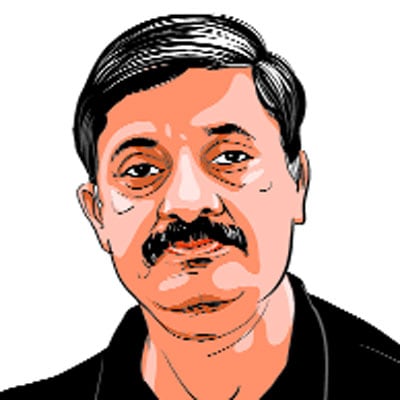Opinion Why Rahul Gandhi got what he deserved and what the outrage against his disqualification doesn’t get
Trust in the judicial process is the foundation of civility in society and to undermine that because we do not like a particular judgment is an attack on civility
 It would be unfair to conflate the disqualification of Gandhi after conviction for defamation with the might of the government and the supposed loss of democratic freedoms in India. (File/PTI)
It would be unfair to conflate the disqualification of Gandhi after conviction for defamation with the might of the government and the supposed loss of democratic freedoms in India. (File/PTI) “Deservedly Disqualified” might be a better title and theme for the editorial carried in this paper (‘Disqualified’, IE, March 25).
Without being coy about it, we need to understand that the court judgment sentencing Rahul Gandhi to prison for two years for criminal defamation has effectively said that Gandhi is both a liar and hurtful to others. It would be unfair to conflate the disqualification of Gandhi after conviction for defamation with the might of the government and the supposed loss of democratic freedoms in India.
Fusing the punishment of Gandhi and his being held legally unsuitable to hold public office with the decline of democracy in India and other accusations against the Narendra Modi government is neither here nor there. That the Modi government does not listen to the Opposition, that it is autocratic, are matters of political opinion and not fact.
The fact is that we can do without liars and snitches in public life. The late Lily Thomas, Senior Advocate, ensured this by convincing the Supreme Court to give a judgment which removes those who are convicted criminals from elected bodies. Gandhi, in the present instance, has fallen foul of that judgement.
Being a politician, a reasonably popular one at that, does not allow anyone to go on and on making irresponsible statements. Making irresponsible statements increases the likelihood of making statements that are also untrue. Once in a while these might also be hurtful to someone. On a rare occasion, someone could take matters personally, haul up the person who is making such statements to court and demand reparations. In Gandhi’s case, the corrective has come in the form of a judge sentencing him to two years of imprisonment; disqualification from holding an elected position followed automatically. If tomorrow on appeal, another judge was to overturn the two-year jail sentence or, reduce it, then his fate changes.
Admittedly, the law can be an ass. At least in India, it functions in ways that can at best be called mysterious. But to imagine that a judgment we don’t like — such as sentencing Gandhi to imprisonment — is either the result of the influence of the government on the judge or, the desire of the judge to ingratiate himself with the government, would be unfair to both the judge and the entire judicial process. The fact is, as various research surveys from the Vidhi Centre have shown, Indian judges are both fair and sensitive. If anything, their problem is that they put in an extra effort to follow the written law literally.
Unfounded insinuations about bias in judgments tend to weaken the very fabric of justice that holds together civility in society and opens the gates for a free-for-all in which only might is right. Trust in the judicial process is the foundation of civility in society and to undermine that because we do not like a particular judgment is an attack on civility.
The usual form of political discourse in India is to make disparaging statements about one’s opponents. Withering nit-picking through which politicians seek to delegitimise their electoral opponents, taunting each other, is expected by the people of India. The millions who routinely tune in to the wild TV news channels of India love the resultant spectacle, even while everyone tut-tuts about the decline in standards of public discourse.
The smarter among our politicians also indulge in tricks that shrewd lawyers use — suggest the falsehood, suppress the truth — in the hope that their audience will then conclude that what actually is true will be believed to be false, while what is actually false will be believed to be the truth. Then, much to the mirth of some in India and the distress of others, there came into public life two politicians who weren’t good at this game of rhetoric.
Arvind Kejriwal and Rahul Gandhi seemed to be willing to make specific accusations that would actually torture the honour and dignity of other people on false grounds. Their usual strategy was to first make an allegation and then insist that the onus of bringing forward the evidence to support the accusation was on the accused.
No other political leader in India does this. At least I don’t know of anyone else who insists that their accusations against others are correct, especially since they have no evidence to back up the accusations. Not even in what is euphemistically called the heat of the moment does anyone other than these two take this second rhetorical step. What they do is to taunt their opponents. Taunting is perfectly lawful unless it falls foul of India’s blasphemy law, Section 295A of the Indian Penal Code.
In the case of Kejriwal and Gandhi, when their opponents refused to participate in their game, they intensified their rhetoric. Then Kejriwal slipped. Carried away by his own enthusiasm, he made specific allegations against specific individuals.
Those persons weren’t babes in the wood either. They promptly hauled up Kejriwal for criminal defamation. After some initial bravado, Kejriwal submitted apologies to each of them. On being challenged similarly, as recently as December 2020, even Jairam Ramesh — who seems to mentor Rahul Gandhi’s public life nowadays – submitted an apology to Vivek Doval.
Rahul Gandhi is different. He is still full of bluster.
The writer teaches history in Panjab University, Chandigarh




